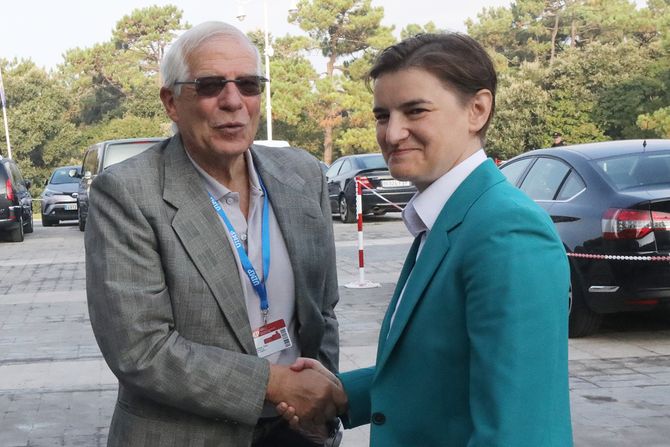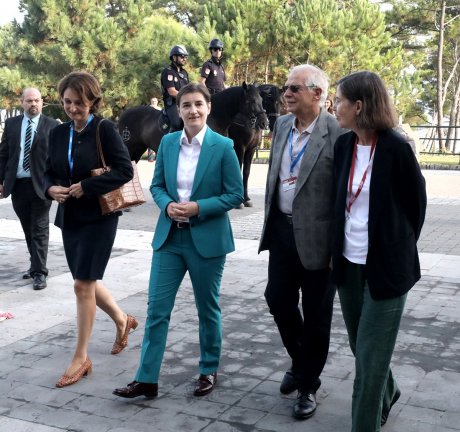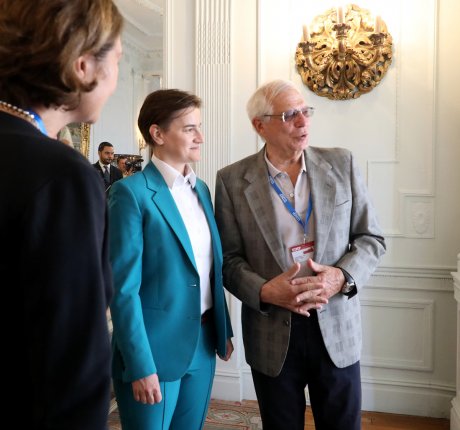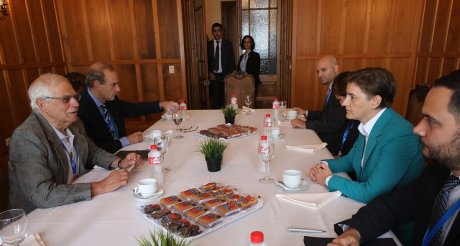
What can Serbia expect if Borrell takes over Belgrade-Pristina dialogue? Here's what he told Brnabic
There is room for better relations between Serbia and Spain, so it's important for the Spanish prime minister to visit Belgrade during this or next year, Serbian Prime Minister Ana Brnabic said after her meeting with Josep Borrell, the Spanish foreign minister and the newly-appointed head of European diplomacy.
The Spaniard confirmed that if takes over as EU high representative, he will be objective and balanced when it comes to the Belgrade-Pristina dialogue.
"We spoke mostly about bilateral relations, there is a lot of room for improving those relations, both politically and economically. A Spanish prime minister has never visited Serbia and that is something that has to change," Brnabic told reporters after the meeting.

She said that there are many bonds between Serbia and Spain, while the goal is for the Spanish PM - should a government be formed in Spain by the end of September - to visit Serbia by the end of the year, or in 2020.
She recalled that a month ago, Serbian Minister of Education Mladen Sarcevic also visited Spain, where he discussed establishing better cooperation in the field of education. Brnabic announced that an entrepreneurial Serbia-Spain forum would be held in Madrid in October.
"We're slowly taking steps to have the best possible political and economic cooperation," she said.

The unavoidable topic of conversation was the issue of Kosovo and Metohija, with Brnabic saying that Borrell represented his country's views - i.e., not recognizing Kosovo's unilaterally declared independence.
"At the end of October, in early November, if he receives European Parliament's confirmation as EU's high representative (for foreign and defense policy) he will represent EU's positions. And EU's position is neutral with regard to Kosovo and Metohija's independence, because there is no consensus among the EU member states. But one of the priorities of the high representative will certainly be, as before, to work on finding a possible long-term solution, long-term normalization of relations between Belgrade and Pristina," said Brnabic.
She added that she drew Borrell's attention to two things that are important from our perspective - the Brussels agreement on normalization, which also has the signature of the high representative, while the EU is the guarantor of its implementation - and which Pristina has failed to implement even six years after it was signed.
"What will the new European Commission (EC) do with the Brussels agreement - will it remain the guarantor, that is, will it do what it has to do with that signature, i.e., guarantee that Pristina implements the agreement," said the prime minister.

The second issue she mentioned to Borrell are Pristina's taxes on goods from Serbia, which are a direct violation of the Stabilization and Association Agreement (SAA) that Pristina signed with the EU.
"What will the EU do about it? The taxes have been in effect for nine months now. If Pristina violates the SAA, what will the high representative and the president of the EC do about it? These are the two basic questions concerning the rule of law and the ability and power of the EU to lead by example and show that the rule of law really matters," Brnabic emphasized.
Today's conversation, she said, did not touch on when the two sides might return to the negotiating table.
"He (Borrell) is a principled man who said, 'I have not yet been confirmed as EU's high representative. If I am confirmed, I will be balanced, objective and one of my priorities will be to put on the table reaching the final resolution of this issue and long-term normalization'," the prime minister said.
She assessed that confirmation of Borrell's appointment as EU's high representative would be a good move for the EU - not because of Serbia's positions, but because Brussels, as she said, needs fewer bureaucrats and more people like Borrell, who are "sincere, brave, with a lot of experience and who can to contribute to EU's stronger voice."
They also discussed the process of further EU enlargement, and when asked by Tanjug what Serbia can expect from Spain on this issue, the prime minister said:
"Spain is a country that supports the enlargement agenda and supports Serbia in this process and sees Serbia as the most important country in the Balkans in this regard, and as a pillar of regional stability - which is why we discussed that it's very important for the prime minister of Spain to visit Serbia and start building a better relationship on that basis."
Brnabic also said that "there is absolutely no question" whether to implement internal EU reforms, or enlargement.
"It's a process that has to go in parallel, at the same time," she said, recalling that new EC President Ursula von der Leyen said enlargement would be one of the priorities.
(Telegraf.rs/Tanjug)
Video: Žikić: U knjizi "Mesto u mećavi" Milan Mladenović je živ, prisutan, tu među nama
Telegraf.rs zadržava sva prava nad sadržajem. Za preuzimanje sadržaja pogledajte uputstva na stranici Uslovi korišćenja.

